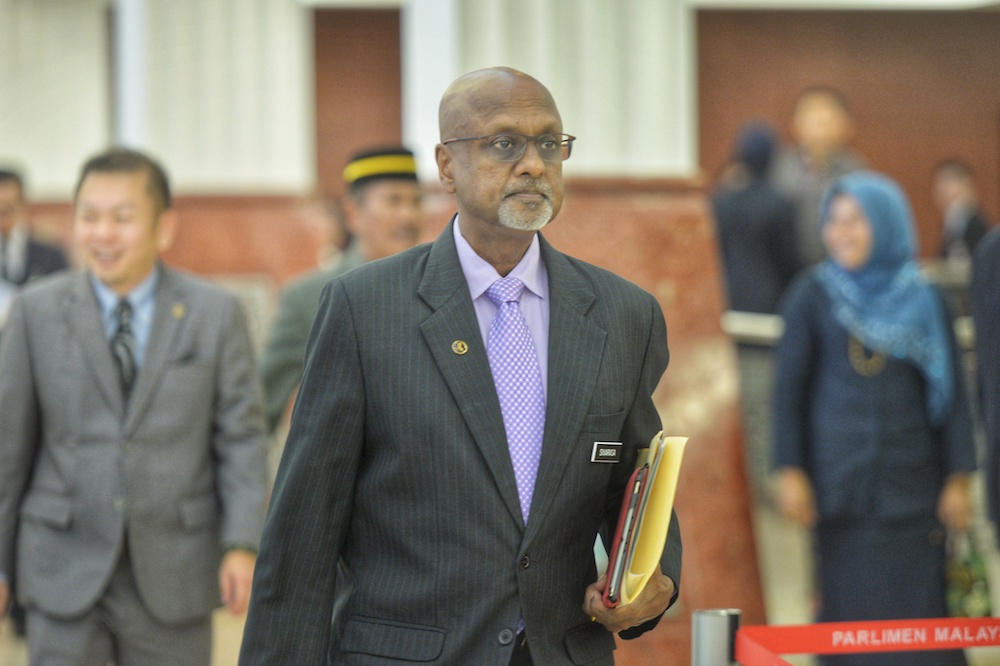KUALA LUMPUR, Sept 15 — The Asean Parliamentarians for Human Rights (APHR) has urged all governments in South-east Asia, including Malaysia, to stop alleged systematic persecution against MPs who are vocal critics of the current administration.
In its latest report titled “Parliamentarians at Risk: Reprisals against opposition MPs in South-east Asia”, APHR said the main tactic used by authorities, including here, to undermine political opposition has been the opening of investigations or filing of purported trumped-up charges against them.
“The authorities of Thailand, the Philippines and Malaysia have been using a range of tactics to intimidate and harass vocal opposition MPs,” said the report.
“By filing politically-motivated cases, stripping parliamentarians of their seats, threatening or surveilling them, and organising online disinformation campaigns, authorities are trying to silence the political opposition.”
APHR also said female lawmakers in the region have complained of sexist vilification they face, which it said poses an additional challenge for women in politics.
“These reprisals against opposition lawmakers do not only violate their fundamental rights, but they also have serious implications, both personally, as well as on an MP’s effectiveness to oversee government’s actions and uphold fundamental freedoms,” it added.
“These reprisals faced by opposition MPs are not isolated, but have gone hand-in-hand with a broader crackdown by these governments on human rights defenders, journalists, and other critics of the government, revealing a systematic attempt at attaining unchecked power and undermining democracy.”
APHR is a regional network of current and former MPs aimed at advancing human rights and democracy in South-east Asia.
For its case study in Malaysia, it gave examples of how in March 2020, PKR MP Sivarasa Rasiah was questioned by police over comments made seven months prior regarding the arrests of 12 people suspected of being involved with the now defunct Sri Lankan group Liberation Tigers of Tamil Eelam.
Sivarasa had then warned that there was a “deep state” working behind the scenes that was plotting to harm the previous Pakatan Harapan administration’s reputation.
It also listed former PKR minister Xavier Jeyakumar, who was questioned by authorities under the sedition act “the improper use of network facilities”. At the time he was questioned, he had made critical comments about a Parliamentary sitting in May 2020, where the king’s speech was the only item on the agenda.
Then came PKR MP Fuziah Salleh who was charged over a Facebook post that falsely depicted chaotic scenes at the Johor customs checkpoint during the height of the Covid-19 pandemic.
“Despite [Fuziah] removing the post and issuing an apology, she is still facing criminal charges and potentially up to two years of imprisonment.
“She has also made a complaint to the Malaysian Communications and Multimedia Commission over alleged breach of procedures during the investigations,” the report read.
Then in June 2020, DAP MP Hannah Yeoh, formerly deputy minister of women, family and community development, was also investigated for sedition.
A remark was posted on social media relating to a roadmap to combat child marriages which was falsely attributed to her. Despite Hannah explaining that the posting was not hers she was still being investigated.
The final example the APHR report gave was for former youth and sports minister Syed Saddiq Abdul Rahman who was questioned over an Al Jazeera interview he gave back in March.
“Bersatu is currently part of the ruling coalition, but Syed Saddiq is one of the five lawmakers sacked from the party in May for sitting on the opposition bench during a parliamentary session.
“While it’s clear that those targeted are MPs from the opposition who have raised matters of public interest, or been critical of the government, these are also lawmakers who held ministerial positions in the previous PH administration, revealing a more targeted form of persecution against senior members of the opposition.
“The laws used against the MPs are also those frequently invoked by authorities to silence dissent and restrict freedom of expression in Malaysia. MPs interviewed by APHR compared the current government’s repressive tactics to those used by the previous Barisan Nasional administration,” the report said.
Apart from that the report also mentioned the raid on Qatar-based news agency Al Jazeera after it produced a documentary on treatment of migrant workers and the contempt of online comments left on an article on news portal Malaysiakini.
In conclusion, the APHR report made several recommendations, chief among them is to drop all politically-motivated charges against lawmakers especially those in the report.
It also urged governments to condemn disinformation, ensure parliamentary immunity and right to freedom of expressions, cease harassment of opposition lawmakers, and initiate reforms of all laws that have been identified as restricting the rights to freedom of expression, association and peaceful assembly.
APHR said its conclusion in the report came from two series of surveys with former and current lawmakers from Thailand, Timor-Leste, Malaysia, Philippines, Myanmar, Indonesia, Cambodia, and Singapore between November 2019 and August 2020.
It also interviewed human rights defenders, journalists, United Nations staff, academics, and other experts, while also collecting and reviewing supporting documents from the interviewees, including court documents, screenshots of social media posts, and statements.
In addition, APHR also sent inquiry letters to 99 political parties from both opposition and ruling coalitions in the seven countries to ask about potential human rights violations faced by their MPs.



















